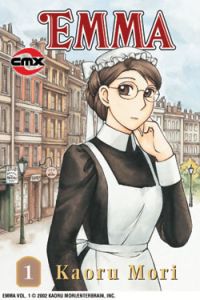RIGHT TURN ONLY!!
Delinquent Schoolboys, Blossoming Schoolgirls
by Carlo Santos,

I think it's awesome that there's now a nationwide awards ceremony for anime in the United States. I think it's cutely ironic that a comics convention was the first to think it up. (How do the Anime Expo execs feel about this?) And I think the MangaCast manga awards, which were inaugurated this year at San Diego Comic-Con, need more publicity, more industry support, and just as much ceremoniousness as this ceremonial ceremony for Japan's animated arts. After all, where would all your anime be without the comics they're based on?
CROMARTIE HIGH SCHOOL

Vol. 8
(by Eiji Nonaka, ADV Manga, $10.95)
FROM THE BACK COVER:
"Hokuto's desperate struggle to come up with a Really Interesting Story is nothing compared to the shadow of despair that has fallen upon Cromartie High! Masked Takenouchi wrestles with the right time to unveil his latest guise, while the real Takenouchi challenges his inner demons to push his motion sickness to the limit. Meanwhile, Kamiyama's attempt to infuse the school's evacuation drill with a sense of urgency leads to dire consequences..."
PROS:
Eight volumes in, and Cromartie is still the kingpin of nonsense humor. The school's delinquents continue to get themselves into bizarre situations, and this time the standout storyline is Takenouchi's ongoing motion sickness therapy. Truly, there is nothing as striking as a massive high school punk barreling down a mountain road ... on a bicycle. With a basket in front. Things only get funnier when he meets a biker gang and puts the fear of God into them. Not to be outdone, the biker gang hires an "assassin" who looks a whole lot like a certain Arnold Schwarzenegger character—which just goes to show how insane this series can get. Even in short one-shot chapters, the jokes continue to be fresh and amusing, with endless variations on the main theme: high school badasses getting completely derailed every time they try to be badass. The stark, tough-guy artwork is the perfect counterpoint to the subject matter, with deadpan faces delivering such absurd lines that the only appropriate reaction is to laugh.
CONS:
The humor often leans towards a "shaggy dog story" approach, where characters ramble on for pages and pages about the most pointless things, and this can get pretty tiresome if the punchline doesn't work. The guys who dress up as KISS are probably the ones most guilty of this, having loopy conversations about odd personal habits and bicycle theft prevention that could probably be twice as funny if they were kept half as long. Others chapters feel like filler gags in search of a good story arc: Fujimoto's contradictory attitude to delinquency and personal computing, for example, relies on a predictable, overused gag. This volume also lacks some of the most well-loved characters in the series: Freddie, Mechazawa, even the seemingly plain Maeda. Surely these guys still have enough comedic potential to deserve some face time.
RTO!! RATING: A-
EMMA

Vol. 1
(by Kaoru Mori, CMX, $9.99)
FROM THE BACK COVER:
"In Victorian England, a young girl named Emma is rescued from a life of destitution and raised to become a proper British maid. When she meets William, the eldest son of a wealthy family, their love seems destined. But in this world, even matters of the heart are ruled by class distinctions."
PROS:
Finally, a historical manga that doesn't involve sword-swinging warriors, feudal political schemes, or magic-wielding spirit hunters! Emma succeeds by virtue of its calm Englishness, setting the mood with subtle characters and rich background details. This is a 19th-century England you can actually believe in, with pubs and horse-drawn carriages and proper manners; a time of polite ladies and noble gentlemen. The best part, of course, is seeing William interact with Emma, proving that the idea of "courting" actually did exist in days gone by. Between William's awkward optimism and Emma's blushing shyness, it's refreshing to see a couple that's just cute and normal for once. The arrival of William's Indian friend Hakim also adds some delightful comic relief. With its confident, detailed artwork and relaxed visual pacing, this Japanese portrait of jolly old England is as absorbing as any by an actual English author. And hey, it's not as wordy as Dickens.
CONS:
That calm, dignified Englishness comes with a price: spending the entire first volume introducing characters and setting up the plot. The issue of class difference isn't even addressed until the final chapter; everything before that is just William casually meeting Emma here and there, plus daily life and the occasional flashback. If you don't find yourself getting into this setting and warming up to the characters, it could get boring pretty quickly. Intensely rectangular layouts also kill off any chance of dynamic visuals—everything is very gray and square, and while the linework is undoubtedly of the finest quality, the rigid panel placement can be numbing to the eye. (Or maybe that's just the dull, flimsy paper that it's printed on—come on, what kind of budget are they allotting to CMX these days?)
RTO!! RATING: B
GENSHIKEN

Vol. 7
(by Kio Shimoku, Del Rey, $10.95)
FROM THE BACK COVER:
"On a lunch break at the Genshiken, Madarame is minding his own business when in walks Angela, a blond, blue-eyed otaku unlike anyone he has ever seen. However, Angela seems to know all about him! It turns out that Angela and her pal Susie, old friends of Ohno's, are visiting from the United States. Angela has a taste for hardcore doujinshi, and Sue can't seem to stop quoting offensive lines from her favorite anime. In just two days, the American visitors manage to turn the Genshiken upside down. Can the club survive a visit from these ambassadors of otakudom without inciting an international incident?"
PROS:
The Americans are coming! The Americans are coming! English-speaking readers will get a laugh out of Genshiken's twisted portrayal, as Ohno's friends turn out to be everything we love to hate about ourselves. The big picture, though, is all about Ogiue and Sasahara's budding romance that just refuses to bloom. What kind of chemistry can you expect between the ultimate nice guy and the coldest girl on earth? Ogiue's stubborn self-denial is endlessly fascinating: she doesn't want to cosplay (but she does), she doesn't want to draw yaoi (but she does), she doesn't like Sasahara that way (but ... well, it's a work in progress). In fact, the only thing more fascinating is Ohno's constant scheming to hook up Ogiue and Sasahara. As always, Shimoku's detailed art captures the rhythms of dysfunctional otaku life: another crowded ComicFest, the always-cluttered clubroom, and in the last chapter, a surprisingly lush rendition of the Karuizawa resort area (complete with hot springs action).
CONS:
With Ogiue and Sasahara's relationship on a low simmer, and several main characters now graduated and dealing with real life, this volume lacks the focus and energy of earlier installments. It's nice to see a couple of guys landing industry-related jobs, but this isn't the Society for Career Advice in Modern Visual Culture, is it? Sad to say, but the spirit of "anime-crazed college kids hanging out" seems to have become fractured. Aside from the salarymen and the job seekers, there's Ohno off in her own little cosplay world, Ogiue on her lone-wolf yaoi track, Kuchiki running around being socially incompetent—you'll still get your dose of subculture humor, but it's like the cast isn't even together anymore. The one time they're all hanging out in the clubroom, they start making plans and then realize that everyone's too busy with other stuff. The summer trip in the last chapter, however, suggests better things to come in Volume 8. Hopefully.
RTO!! RATING: C+
LOVE ROMA

Vol. 4
(by Minoru Toyoda, Del Rey, $10.95)
FROM THE BACK COVER:
"Hoshino's never been afraid to tell Negishi just how he feels about her. Hoshino loves Negishi heart and soul—after all, she's his very first love. But suddenly it's gotten harder to share his feelings, because now he's feeling something he's never felt before: jealousy!
The new boy at school, Wakaba, has a major crush on Negishi. And when Wakaba and Negishi become friends, Hoshino gets worried. Is Negishi pulling away from him? And will Hoshino's silence only make things worse?"
PROS:
Love on the rocks? Even the refreshing innocence of Love Roma can fall victim to negative waves: Hoshino grows jealous of Wakaba's cheeky attitude, and several chapters later, Negishi feels the same way when she sees Hoshino constantly arguing with another girl. As usual, however, the series' spirit of optimism prevails, and these troubled feelings always lead to heartwarming moments of reconciliation. Other chapters echo the same sentiments: Hoshino and Negishi realize how much they need each other when they go into self-imposed cram-school isolation, and learn the value of school activities like running for class president. The best story, though, is the one that puts side characters in the spotlight for Valentine's Day. This portrait of unrequited love is so pure, so honest, it's no wonder the manga-ka picked it as his favorite. The quirky, bold-lined art adds to that honesty, and works surprisingly well in both the comedic and romantic realms.
CONS:
Others will argue that the art is too stiff and unconvincing—and yes, it's true that there are no swishy young men or curvy bishoujo heroines to be found here, so the series depends a lot on the appeal of the characters. As it turns out, that appeal can be an acquired taste; the lead characters have such extreme personalities that they stretch the limit of believability. Surely nobody can be as much of a bonehead as Hoshino—now there's a guy who literally says every single thought that enters his brain—and surely hot-tempered Negishi should have given up on him ages ago. An awkward sense of humor also disrupts the flow at times: there might be one or two brilliant comedic turns, but several forced laughs after that. Just because the lead characters have a boke-tsukkomi relationship going doesn't mean that they have to do that routine all the time.
RTO!! RATING: B
QUEENS

Vol. 1
(by Sung-Hyen Ha, Tokyopop, $9.99)
FROM THE BACK COVER:
"Meet Pil-Hyun Jung, a self-proclaimed pretty boy hoping to inject a little more macho into his manhood. He is known as 'Teddy Boy' by his classmates, and for good reason: he has a particular affection towards cuddly bears, and he's sweet and has good looks—not to mention a natural charm. But what Pil-Hyun really needs is to learn what it means to be one of the guys! And who would be up for a task to mentor our hero? Enter Bok-Nam Park, Ah-Yung Sohn, and Hyun-Ja Lee—a colorful crew that's about to give Pil-Hyun a makeover!"
PROS:
This one's for all the bishounen lovers out there ... and haters, too. The pretty-boy genre has turned on itself at last, using Pil-Hyun as a punching bag for every joke you've ever wanted to make about guys with sparkling eyes, flowing hair and lithe, hairless bodies. Fans and detractors alike will laugh as they see familiar traits deconstructed and lovingly mocked, often with reference to Pil-Hyun's sexual competency (or lack thereof). For added comic effect, his main rival at school is the manliest of manly men—and the resulting confrontations lead to some of the best slapstick humor in any genre. Even the old "falling on top of someone" gag is funny in this story—probably because all the other stereotypes have already been skewered, so why not go for the old warhorse? Add in some wild facial expressions and an even wilder supporting cast and you've got one seriously funny comedy.
CONS:
Step back a moment from the nonstop humor and it's easy to spot the weakness that befalls most comedies: not enough of a story to back up the jokes. This one tries to make something out of Pil-Hyun's quest to be more manly, but after one volume, all he's done is shack up with a starving comic artist and a couple of flamboyant art assistants. Not exactly the most encouraging plot development. If anything, this series runs the danger of turning into a repetitive sitcom—but that's an issue for Volume 2 to address. The artwork, meanwhile, is attractive but unexciting (apart from the masterful slapstick scenes). The trouble with poking fun at pretty boys is that you end up drawing, well, a lot of pretty boys, and the style ends up looking like everything else in the genre. The content, however, is decidedly unique.
RTO!! RATING: B+

MARIA-SAMA GA MITERU (novel)

Vol. 1
(by Oyuki Konno, Shueisha, ¥480)
FROM THE ENCYCLOPEDIA:
"Yumi is a first year student at the Lillian School For Girls, an exclusive all girls' Catholic school. The school has a tradition that older girls take a younger girl as their little sister or 'soeur' (French for 'sister') in order to instruct and look out for them. Though Yumi admires Sachiko, a reserved second year student who is a member of the student council, she has no hopes of being chosen as her soeur. When an innocent encounter leads Sachiko to impulsively ask Yumi to be her soeur, Yumi is suddenly brought into the inner circle of the Roses, who are the members of the student council. With Sachiko at her side, Yumi begins to unravel and understand the relationships between the Roses and their soeurs and figure out her own feelings for Sachiko."
PROS:
Take the classic rags-to-riches tale and dress it up in Catholic schoolgirl uniforms, floral allusions and specialized vocabulary. ("Gokigenyou.") That's
CONS:
A social-ladder-climbing fantasy is exactly that: a fantasy, and this novel has to really tweak the private-school concept to make it work. Imagine a world where teachers are reduced to ambient shadows and schoolwork is practically nonexistent. Most of the action happens in an extra-curricular environment, which forces the story into a skewed portrayal of school life that has very little to do with actual schooling. Another side effect of this is the dependence on familiar themes like cultural festivals, cleaning routines, and student hierarchy, which can seem very contrived and repetitive if you've been through any number of "high school days" series. The characters aren't perfect, either—Yumi is the epitome of low self-esteem, so if weepy-weed protagonists bother you, then this one's going to be a struggle. The supporting cast is also pretty weak, relying on stereotypes to fill out the student body. This novel isn't exactly original, but what it does, it does with grace.
discuss this in the forum (15 posts) |